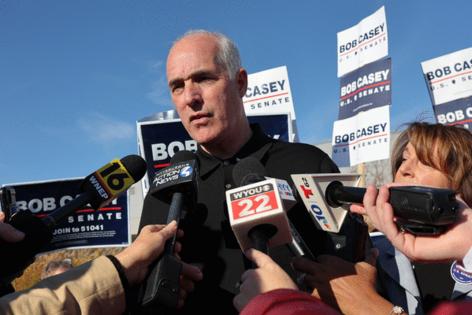Editorial: Election laws aren't optional for either party
Published in Op Eds
As America’s unaccountably slow vote-tallying process enters its third week, one thing should now be clear: This should be the last election where anyone, of either party, questions whether the law needs to be followed.
Throughout this year’s presidential campaign, Democrats had worried that Donald Trump might not accept defeat on Nov. 5. Many warned that Republican election administrators in swing states might join him in attempting to steal votes and defy the courts. Then a handful of rogue Democratic officials in Pennsylvania tried to do exactly that in a US Senate race — and, for a while, their party leaders shamefully went along.
The dispute concerned the rules for tallying mail-in and absentee ballots. State law stipulates that such ballots are invalid if they’re submitted in undated or misdated envelopes. Yet election administrators in several counties decided to defy the law and count the undated ballots all the same.
Is requiring voters to date their envelopes necessary? No: All ballots had to be received by the time the polls closed on Election Day in any event, no matter what date a voter marked. But so long as the law remains on the books, there shouldn’t be any question about following it. The reason for the administrators’ insubordination was that Democratic Sen. Bob Casey was trailing his challenger, David McCormick. Casey hoped that if enough undated and misdated ballots were counted, they could help put him over the top.
In mid-September, the state Supreme Court issued an order blocking a lower court decision that would’ve allowed such ballots to be tabulated and counted. In early October, it upheld the law again, writing: “This Court will neither impose nor countenance substantial alterations to existing laws and procedures during the pendency of an ongoing election.” On Nov. 1, days before the vote, the court once again upheld the law. As one justice wrote in exasperation: “We said what we meant and meant what we said.”
Nevertheless, incredibly, some election officials still ignored the message. “I think we all know,” said Bucks County Commissioner Diane Ellis-Marseglia, “that precedent by a court doesn’t matter anymore in this country, and people violate laws any time they want.”
That’s exactly the kind of sentiment Democrats feared following a Trump loss. They were unable to recognize that they had turned into the very monster they spent four years warning the public against.
Although news organizations called the race for McCormick relatively quickly, Casey refused to concede for more than two weeks. That was his right. But after making election integrity a central issue in the 2024 campaign, his willingness to back officials who openly defied a court order was hypocritical in the extreme.
There’s plenty of hypocrisy to go around, of course. In 2022, when McCormick came out on the losing end of his first run for Senate, he went to court to make the same argument Casey has been making: that the technically faulty ballots should be counted. Unsurprisingly, he reversed his position this time.
On Nov. 18, the court was forced to rule one more time that the law is the law. After the ruling, Ellis-Marseglia apologized for her comment and Pennsylvania Governor Josh Shapiro backed the court: “I expect all county election officials,” he said, “to adhere to this ruling and all the applicable laws governing our elections.” Casey finally acknowledged reality on Nov. 21.
Ultimately, the law was followed, the rightful victor prevailed and no significant damage was done. But shenanigans like this aren’t harmless. They undermine confidence in the entire electoral process. They erode the norms that democracy relies on. And they worsen the polarization that makes American politics so divisive. Enough.
____
The Editorial Board publishes the views of the editors across a range of national and global affairs.
©2024 Bloomberg L.P. Visit bloomberg.com/opinion. Distributed by Tribune Content Agency, LLC.




























































Comments